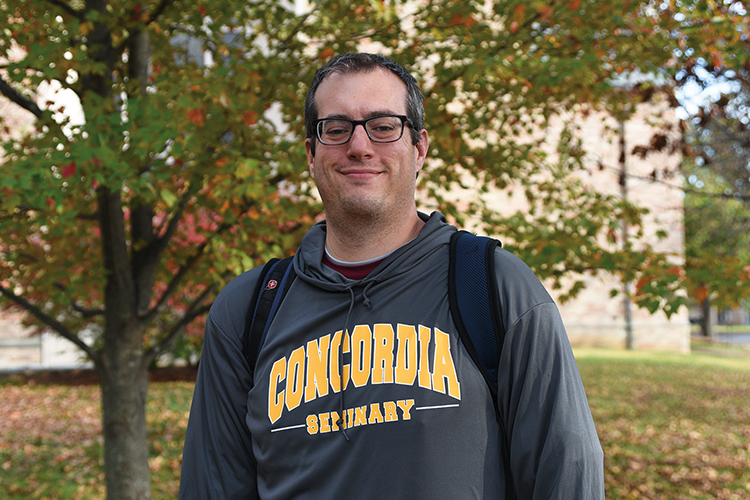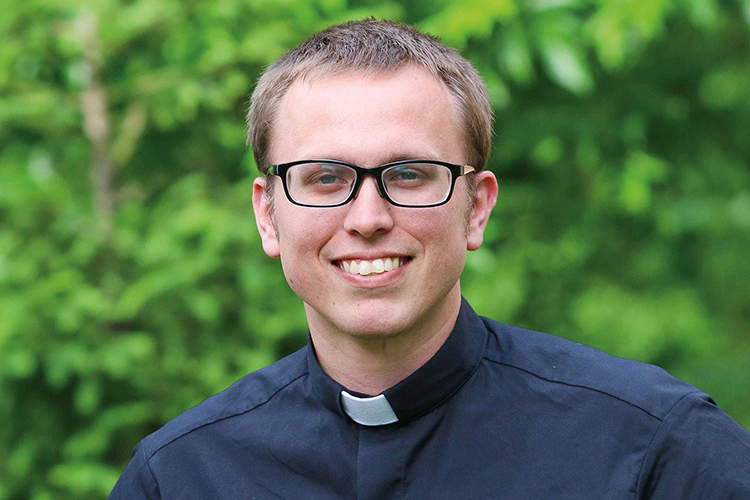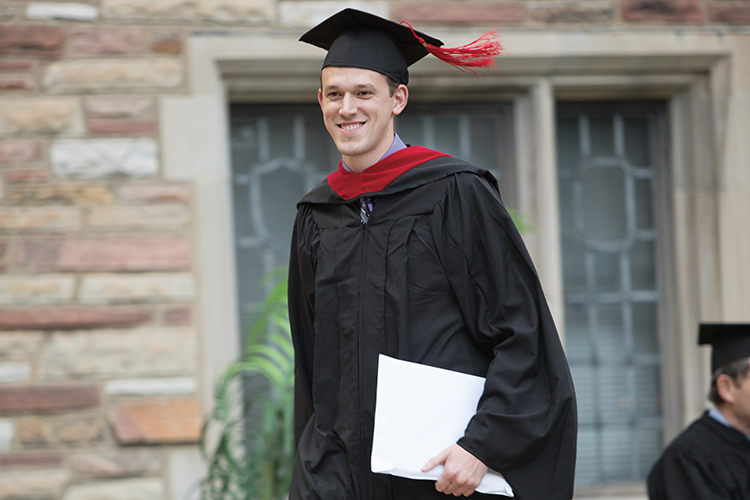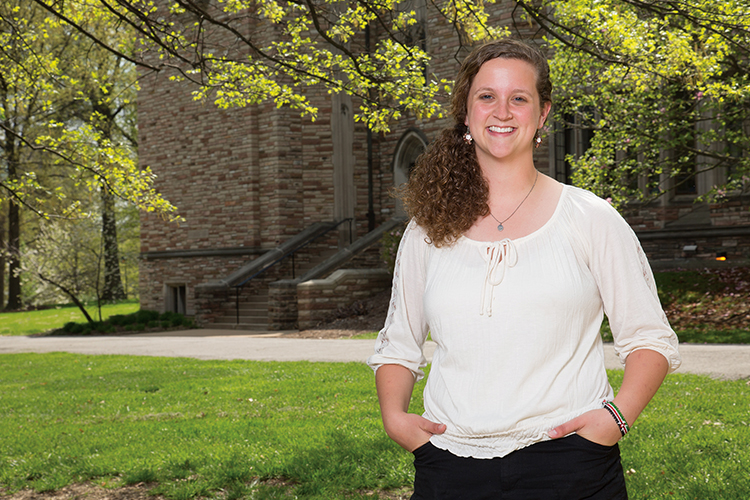
Concordia Seminary Newsroom
Coast to Coast

By Kim Plummer Krull
When friends heard about Rob Bailey’s first call as associate pastor at a Houston, Texas, congregation with more than 2,000 baptized members, many likely pictured him at Gloria Dei Lutheran Church, helping with worship and Bible studies.
Instead, this new Seminary graduate’s main role is to plant a new church in a neighboring suburb.
“Gloria Dei is looking to reach out in a growing community that has no LCMS church, and they’re calling me to help make that happen,” said Bailey, who describes his first call as “exciting and scary at the same time.”
That’s just one example of how the list of pastoral candidates announced on Call Day 2017 from Concordia Seminary, St. Louis “doesn’t really tell the whole story,” said Dr. Timothy Saleska, dean of Ministerial Formation.
Geographically, it’s obvious that these new pastoral graduates will be serving from coast to coast. Fifty-six students received calls on April 26 to serve as pastors, missionaries and chaplains — from Sunnyvale, Calif., to Mountainside, N.J.; from Kenai, Alaska, to Lake City, Fla.
But the variety of doors they seek to open is impossible to fathom from the placement and position written next to a graduate’s name. About half of this year’s pastoral students were placed in sole pastor calls. And the other half were called by congregations to serve as associate pastors or assistant pastors. The titles, Saleska says, do not convey the ministry opportunities these men are tackling.

Rob Bailey

Andrew Johnson

Mark Duerr

Kelly Jacob
Sharing Jesus in Houston suburb
“In a bigger congregation, one pastor can’t do everything. Our graduates are in high demand for team ministry,” Saleska said, a change from 30 years ago when the majority of calls were to serve as a congregation’s sole pastor.
Many of these new associate pastors and assistant pastors are called to strengthen a specific ministry, such as youth or family. Others will focus on church revitalization or, like Rob Bailey, on church planting.
“Like the circuit riders of old with their preaching stations, I get to go out and share Jesus where people are in the community,” said Bailey, who will begin his ministry by getting acquainted with others in League City, a Houston suburb with lots of young families but few churches.
Gloria Dei owns property in this community of some 100,000 people, many who reflect “what’s going on in today’s society, where belonging to a church and going to church isn’t as important as it once was,” Bailey said.
“I’ll need to be entrepreneurial, but the blessing is that Concordia Seminary equipped me with the foundation of knowing who we are as Confessional Lutherans and how to go out and share the love of Christ and what He has done for us,” he said. “It’s exciting!”
Keeping rural church doors open
About half of the Seminary’s graduating seminarian candidates were called as a congregation’s sole pastor, including a few who will serve dual parishes.
“We’re also seeing more districts where a larger congregation walks alongside a smaller congregation to help with a vacancy, and the two congregations continue to work together,” said Dr. Wallace Becker, director of Placement, mentioning congregations working in partnership in the LCMS Nebraska, South Dakota and Iowa West districts.
Such a call will bring Andrew Johnson to Trinity Lutheran Church in Manilla, Iowa, a rural community of some 700 people and churches that are “mostly hurting or slated to close.”
“The people of Trinity love their church and are working to keep their doors open,” said Johnson, who will serve as Trinity’s pastor, working closely with the Rev. Jonathan Conner, pastor at Zion Lutheran Church in nearby Manning.
Johnson values “the general pastoral wisdom as well as the very specialized insights” of Conner, a 2004 Seminary graduate who also served as Trinity’s vacancy pastor.
The two pastors plan to combine youth activities and join forces teaching confirmation classes. “Two congregations of people are excited to see where God is leading us,” Johnson said.
Helping Nevada teens ‘Stay in the Faith’
The title next to Mark Duerr’s name stood out on the Call Day list. He was the only graduate called to serve as a high school theology instructor.
As a college student pondering careers, Duerr says theology classes deepened his faith and helped lead him to the Seminary.
Now he hopes to make an impact on the 130 students at Sierra Lutheran High School in Carson City, Nev., and help “them understand what they believe and why they believe it.”
Along with striving to build a strong spiritual foundation that the teens will carry into their adult lives, Duerr sees his call an opportunity to help strengthen the LCMS.
“Our church is losing a fair number of young people, and we need to make an effort to keep them,” said Duerr. He will head Sierra Lutheran’s theology department and help implement a new theology curriculum. He wants students “to understand why it’s important to stay in the faith,” he said.
Welcoming homeless, young professionals
Just as graduates leave the Seminary to various ministries, they also travel different routes to their calls. Some came through the Seminary’s Center for Hispanic Studies, the Ethnic Immigrant Institute of Theology, or the Specific Ministry Pastor and Deaconess Studies programs.
Deaconess Kelly Jacob — one of five deaconesses who received calls on Call Day — was called to reach out to Prince of Peace Lutheran Church’s diverse community in Cincinnati, Ohio, from the homeless to young professionals.
While Prince of Peace’s ministries to the homeless are well-known, the congregation is searching for ways to also connect with higher-income neighbors moving to the inner city.
“We want to be a welcoming place for all people to come, a place where every person is shown they have worth and value in Christ’s eyes,” said Jacob, who also served her internship at Prince of Peace.
Serving such distinct demographics is a challenge, she agrees. But Jacob looks forward to using the solid theological training and practical social work skills she gleaned through the Seminary’s Deaconess Dual Masters Degree Program in partnership with Saint Louis University.
“We hear lots of stories, of good and bad, ups and downs,” she said. Whatever the story, the deaconess “tries to speak words of hope and encouragement into what seems to be hopeless situations.”
More calls than candidates
While these new church workers tackle ministry challenges, many congregations also face a huge ministry hurdle — a prolonged wait for a pastor due to the shortage of graduates at both LCMS seminaries.
“We had so many calls this year, both for team ministry and sole pastoral ministry, but there weren’t enough candidates to supply all the needs,” Becker said. Many students had as many as 10 interviews with calling congregations.
Of the 160-plus calling congregations, some 60 congregations “wanted a pastor and didn’t get one,” Becker said. As much as he loves serving in Placement, “the hardest part of my work is that we don’t have enough candidates for every congregation to have a pastor.”
The prayer, of course, is that the hope in Christ these graduates share in their new ministry fields grows and, perhaps, even blossoms in future students considering church work vocations.
“I’m so proud of our graduates and the dedicated servants they will be for the Lord as they head into some challenging ministries,” Saleska said. “May the Lord bless them wherever they serve.”
Kim Plummer Krull is a St. Louis-based freelance writer.